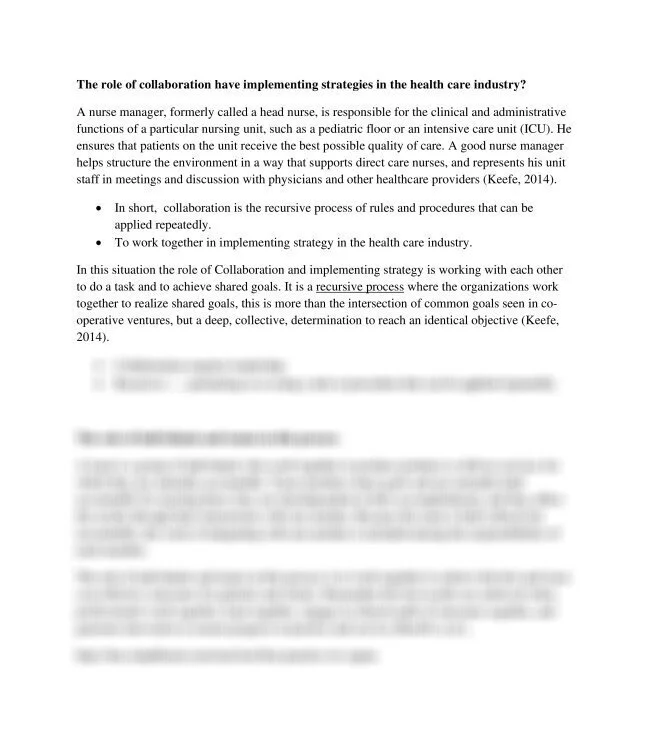The role of collaboration have implementing strategies A nurse manager, formerly called a head nurse, is responsible for the clinical and administrative functions of a particular nursing unit, such a
The role of collaboration have implementing strategies A nurse manager, formerly called a head nurse, is responsible for the clinical and administrative functions of a particular nursing unit, such a
(2001). (2014). (Borrill, (ICU). (Keefe, -----pertaining 2014). A A. A., Because Borrill, C., Carletta, Carter, Collaboration D., Dawson, GarrodThe role of collaboration have implementing strategies in the health care industry?
A nurse manager, formerly called a head nurse, is responsible for the clinical and administrative functions of a particular nursing unit, such as a pediatric floor or an intensive care unit (ICU). He ensures that patients on the unit receive the best possible quality of care. A good nurse manager helps structure the environment in a way that supports direct care nurses, and represents his unit staff in meetings and discussion with physicians and other healthcare providers (Keefe, 2014).
• In short, collaboration is the recursive process of rules and procedures that can be applied repeatedly.
• To work together in implementing strategy in the health care industry.
In this situation the role of Collaboration and implementing strategy is working with each other to do a task and to achieve shared goals. It is a recursive process where the organizations work together to realize shared goals, this is more than the intersection of common goals seen in co-operative ventures, but a deep, collective, determination to reach an identical objective (Keefe, 2014).
• Collaboration requires leadership
• Recursive -----pertaining to or using a rule or procedure that can be applied repeatedly.
The role of individuals and teams in this process
A team is a group of individuals who work together to produce products or deliver services for which they are mutually accountable. Team members share goals and are mutually held accountable for meeting them, they are interdependent in their accomplishment, and they affect the results through their interactions with one another. Because the team is held collectively accountable, the work of integrating with one another is included among the responsibilities of each member.
The role of individuals and teams in this process is to work together to achieve the best and most cost-effective outcomes for patients and clients. Remember the best results are achieved when professionals work together, learn together, engage in clinical audit of outcomes together, and generate innovation to ensure progress in practice and service (Borrill, et al.).
http://lms.simplilearn.com/user/test/free-practice six sigma
References
Keefe, S. (2014). eHow. Retrieved from http://www.ehow.com/about_5502676_role-nursing-manager.html
Borrill, C., West, M., Dawson, J., Shapiro, D., Rees, A., Richards, A., Garrod, S., Carletta, J., and is him Carter, A. (2001). Team working and effectiveness in healthcare. Retrieved from
, He In It J., Keefe, M., Recursive Rees, References Remember Retrieved Richards, S. S., Shapiro, Team The To West, a accomplishment, accountable accountable, accountable. achieve achieved administrative affect al.). among an and another another. applied are as audit be best but called can care care. clients. clinical co-operative collaboration collective, collectively common cost-effective deep, deliver determination direct discussion do eHow. each effectiveness engage ensure ensures environment et floor for formerly from functions generate goals goals, goals. good group have head health healthcare healthcare. held helps him his http://lms.simplilearn.com/user/test/free-practice http://www.ehow.com/about_5502676_role-nursing-manager.html identical implementing in included individuals industry. industry? innovation integrating intensive interactions interdependent intersection is leadership learn manager manager, meeting meetings member. members more most mutually nurse nurse, nurses, nursing objective of on one or organizations other outcomes particular patients pediatric physicians possible practice procedure procedures process produce products professionals progress providers quality reach realize receive recursive repeatedly. represents requires responsibilities responsible results role rule rules seen service services share shared short, sigma situation six staff strategies strategy structure such supports task team teams than that the their them, they this through to together together, unit unit, using ventures, way when where which who with work working •
A nurse manager, formerly called a head nurse, is responsible for the clinical and administrative functions of a particular nursing unit, such as a pediatric floor or an intensive care unit (ICU). He ensures that patients on the unit receive the best possible quality of care. A good nurse manager helps structure the environment in a way that supports direct care nurses, and represents his unit
